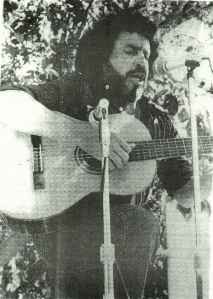 he old Mingan).
he old Mingan).| Alí Primera's biography. |
Stages
He was born on October 31th, 1941; at 2, his father dies due to a gunfire in the prefecture where he was working, he was injured by Pedro Agüero in a deadly accident. Primera's family starts a trip toward San José de Cocodite, his brother Asisclo gets a work as officeboy in La Creole, then passes to the military service.
Primera's life in Caja de Agua is hard, so they soon come back to San José where in a borrowed orchad Alí certifies his work at a very early sower age, where he shares moments with Monche, Uncle Juan and with Héctor Bagüeuto. In a corner of Corea Street, Alí is near Pedro Moreno Valles with a four-string guitar in his hand together with Pedro Padilla in the guitar, where Alí continues as listener.
Asisclo gets a house in Las Piedras Junior Staff field and also a work for Héctor and Alí as the military command "cachifo"(youngster) where they clean cooking stoves, serve food and water the gardens. They also become bootblacks, with a booth of "today I don't guarantee, tomorrow I'll". When Monche returns from Caracas registers Alí and Héctor in the Raúl Lugo school, where they are accepted in the 2do grade.
In this
stage emerges Raúl "Caburito" Quintero his friend;
friendship was always for Alí from early age a fundamental
concept. He continues elementary school studies in the Alejandro
Ibarra scholastic group in Caja de Agua, where he gradustes. It's
at 14-year-old age when Alí with a four-string guitar he was
given by his brother starts to play love songs, at the same time
accompanied by the anti Pérez Jiménez dictatorship propaganda
and the gatherings with the fishermen (Juan Bariaca, Tulio
Guariato, Bolivita and t he old Mingan).
he old Mingan).
His mother, Mrs. Adela mentions us the Reyes family from Las Piedras, which loved his Alí as a son. At that time Héctor and Alí enter boxing in the "Pico y Palma" Bar. Alí goes to Caracas in 1956, where he enters the Caracas Lyc in order to accomplish his baccalaureate. For 1958 he appears with a red beret and a card that carried him to join the Urban Guerrilla.
For this stage the Cuban Revolution triumphes and Fidel, Che and Cienfuegos become the Communist parties hope on behalf the Latin American society redemption. Alí enters the Central University of Venezuela, to begin thus in 1961 the career of Chemistry Engineering. His militant fight continues, his voice will not be able to be shut, though for Raúl Leoni's government falls prisoner and composes "Humanity" in the DIGEPOL jails.
For 1968, Alí awards a scolarship by PCV (Communist Party of Venezuela) to continue his studies in Romania. After two years, before obtaining the grade, when he almost completes the thesis, writes to his mother and indicates her that he didn't want to be submitted to the oil companies exploitation; this is as well as he starts his trip to Sweden where he has his first two children with the Swedish Tarja Osenis, these will be: María Fernanda "Shimpi" and María Angela "Marimba".
Then he leaves to Germany where with Mexican songs learned from Pedro Infante, sings to obtain his livelihood. In Germany achieves to record his first songs with social content. He will always remember the bricklayer who told him "don't sell your singing, because if you sell it you sell me, beacuse if you sell it you sell yourself". From there he will continue his march toward Poland and the Soviet Union where sings in the Red Square of Moscow.
Alí returns to Venezuela in 1973, where in the search of the popular unit, accompanies José Vicente Rangel and the MAS. In Barquisimeto knows his future wife (Sol Musset), the one who had just won the contest of "the lycéeist voice" and presented in the "first Venezuelans" festival in 1977.
Then the fade of his days would be intended to the fight for the people, to the singing for the masses and to his incredible solidarity with the fight of "The Good Fatherland". As years pass away, persecutions against him increase; the attempts are more frequent, the threat Alí's singing meant for the system domes become every time more solidary and a day (February 16th, 1985) a deadly car accident fills of mourning the people of Venezuela.
"Song in song, fight in fight, we will be forming the song that sings to the people that has always sung us. Take your guitar, fist your conscience and sing... note your commitment against those who cause the existance of persons of our people living just a little better. We have to "arm" our songs with our own conduct, not with gleaned phrases in interviews, falling in pretentious poeticization is losing ourselves...
 |
| Most recent revision: Feb., 26, 2002. |